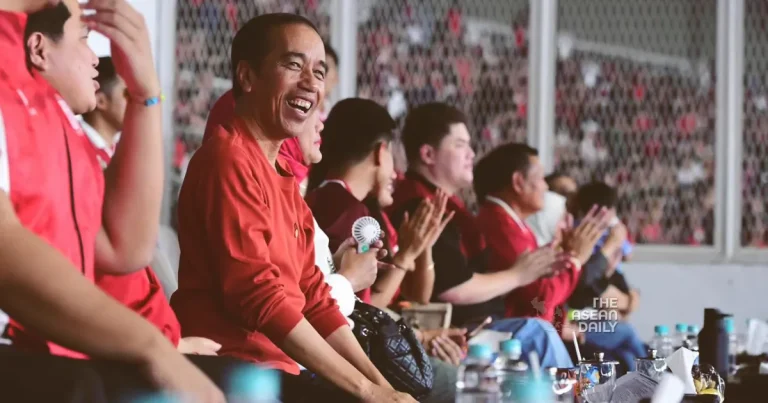31-10-2023 (MANADO) In Indonesia, a nation with three presidential hopefuls gearing up for the upcoming elections, private car driver Daniel Grega, hailing from Manado in North Sulawesi, admits he can’t recall the full names, let alone the political leanings or party affiliations, of the candidates. He simply leaves it to someone else to make the choice for him.
“Why do I need to know all this? I’m just going to go with who Pak Jokowi tells me to vote for,” he asserts, using the widely-used name for President Joko Widodo.
Mr. Daniel’s sentiment is not unique, serving as a testament to the profound influence that President Widodo wields, particularly when it comes to the presidential and vice-presidential elections scheduled for February 2024.
The contenders for the presidency include Defence Minister Prabowo Subianto, 72, former Central Java governor Ganjar Pranowo, 55, and former Jakarta governor Anies Baswedan, 54.
Remarkably, Mr. Widodo maintains an approval rating exceeding 70%, an impressive achievement for a president with just 11 months left in office. He celebrated his ninth year in office in October.
This substantial influence can be attributed to several factors, including his efforts to enhance infrastructure in remote areas of the country and his consistent interaction with ordinary citizens.
In remote North Sulawesi, for instance, Mr. Widodo inaugurated three special economic zones in 2019, aiming to stimulate economic growth and investment. He also advocated for the improvement of Likupang’s airport to boost tourism and visited the area in January to inspect the airport and other locations.
In Labuan Bajo, a fishing town on the edge of East Nusa Tenggara, which is a more than two-hour flight from Jakarta, residents were elated when it hosted the 42nd ASEAN Summit in May. Mr. Widodo’s decision put the town on the global map and encouraged tourists to explore its natural wonders, including the native Komodo dragons and pink sand beaches.
“Only after Pak Jokowi became president did people know about NTT. No one cared before that, so we are very thankful,” said Mr. Rudy, a hotel security officer in Labuan Bajo, who, like many Indonesians, goes by a single name. “He made sure we have good roads, so people can come. Pak Jokowi took care of us, so whoever he chooses will continue to take care of us too.”
Beyond infrastructure improvements, voters also appreciate Mr. Widodo’s hands-on approach. For the past nine years, he has regularly conducted unannounced visits, known as “blusukan,” to check government offices, traditional markets, malls, disaster zones, and forest fire hot spots.
Galang Winarno, a restaurant service staff member in Bitung, North Sulawesi, recalls the President’s visit to his city in 2019 when thousands turned up to see him. “I don’t know any other leader who does this. He will endorse someone who will carry on his level of caring for the people, so I will listen to him,” said Mr. Galang.
While experts generally agree that President Widodo deserves his high approval ratings, some have pointed out that this image may not present the full picture.
Made Supriatma, a visiting fellow in the Indonesia Studies Programme at the ISEAS-Yusof Ishak Institute, noted that President Widodo has established a dedicated and loyal following by positioning himself as an everyday person, in contrast to the political elite.
“It’s undeniable that Jokowi is a popular president who has delivered on some of his campaign promises. Many people have witnessed significant infrastructure development and major projects taking shape during his presidency,” added Mr. Made.
However, he emphasized that the benefits of these projects are not evenly distributed, and the lack of a robust opposition and limited influence of independent voices from civil society tend to downplay the negative consequences of infrastructure development.
For example, violent clashes broke out in September between authorities and residents on Rempang Island near Batam when villagers were ordered to relocate to make way for a multibillion-dollar China-funded investment project.
Recently, concerns have arisen about alleged attempts by President Widodo to interfere in elections. “Jokowi’s intervention in placing his children in pivotal roles carries negative consequences for democracy on both substantial and trivial levels,” said Mr. Made. “It appears that his confidence in his influence may be leading him to take actions that risk undermining the democratic process.”
President Widodo’s elder son, Gibran Rakabuming Raka, 36, was announced as the vice-presidential candidate for frontrunner Prabowo in October. With President Widodo’s other son, Kaesang Pangarep, 28, serving as chairman of the influential Indonesian Solidarity Party, some perceive the President as attempting to establish a political dynasty as he approaches the end of his term.
Dedi Dinarto, lead Indonesia analyst at public policy advisory firm Global Counsel, expressed concerns about President Widodo’s decision to field Gibran as a vice-presidential candidate, as it raises questions regarding the President’s exercise of power and influence to advance his family’s political interests. “The perception that he is involved in the process in his capacity as the president, if true, is unprecedented,” he stated.
These criticisms have been brushed aside by the President, who has insisted that the people will decide who their leaders will be. On Monday, he hosted the three presidential candidates for lunch at the Presidential Palace to signal his neutrality. However, not everyone is convinced. On Tuesday, English daily The Jakarta Post noted that the lunch was met with indifference and accusations of insincerity, given the “stark evidence” of his preferential treatment of certain candidates.




